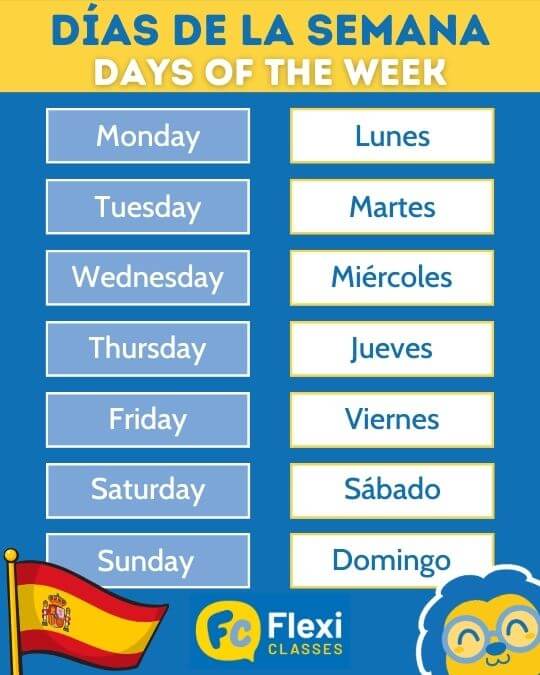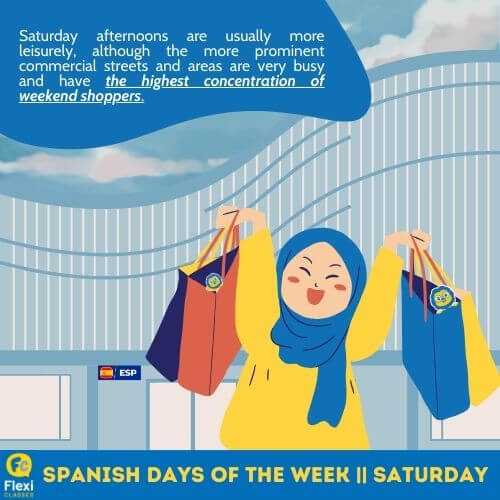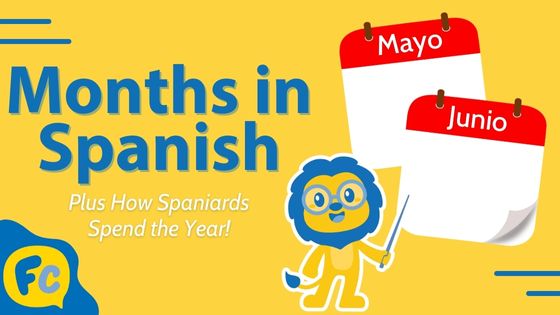Spanish Days of the Week - Essential Beginner Vocabulary
Days of the Week in Spanish || How to make the Most Out of Your Week like a True Spaniard 📆 🇪🇸
For starters, a bit of mnemonics to help you remember the Spanish days of the week.
Let’s Meet on Mondays of January, Very Sunny Days.
Lunes, Martes, Miércoles, Jueves, Viernes, Sábado, Domingo

🔎 A tip: In Spanish, the days of the week are all in masculine form, that should also make them easier to remember.
Knowing the days of the week is essential in any language, whether you’re going out on a date or choosing which day to grab some paella (keep reading to find out when the Spaniards do it!)
So in this article, we’re going to teach you how to say each day of the week AND give you lots of cultural insights into how the Spanish people typically spend each day.
Let’s dive in!
| Spanish | English |
|---|---|
| Lunes | Monday |
| Martes | Tuesday |
| Miércoles | Wednesday |
| Jueves | Thursday |
| Viernes | Friday |
| Sábado | Saturday |
| Domingo | Sunday |
A well-known Spanish proverb advises that, Alli donde fueres, haz lo que vieres – equivalent to ‘When in Rome, do as the Romans do’.
And on that note, let’s dig into some of the local practices typical to each of the Spanish days of the week!
Let’s break down the weekdays, or Días de la semana
Spanish Days of the Week || Monday, Let’s Get the Week Started on the Right Foot
Spanish Days of the Week || Tuesday, Market Day
Spanish Days of the Week || Wednesday, Movie Day
Spanish Days of the Week || Thursday, Let’s Have Paella for Lunch
Spanish Days of the Week || TGIF, ¡Por Fin es Viernes!
Spanish Days of the Week || Saturday, Errand Day
Spanish Days of the Week || Sunday, Family Day
Spanish Days of the Week || FAQs
Spanish Days of the Week || Monday, Let’s Get the Week Started on the Right Foot!

👉 Let’s start the week on a good note or as you’d say in Spanish: Vamos a empezar el lunes con buen pie (‘Let’s start Monday off on the right foot’).
Even if you scowl at the thought that the weekend is over, we can offset any sour moods by greeting someone with a ‘Happy Monday’ (¡Feliz lunes!)
Alternatively, you can ask the people around you ¿Qué tal el fin de semana? (‘How was your weekend?’).
🔎 A tip: When in a restaurant, it is a well-known fact that on Mondays, ordering fish is not your best choice, since fishing resumes on Monday after the weekend halt.
| Spanish | English |
|---|---|
| speak ¡Feliz lunes! | Happy Monday |
| ¿Qué tal el fin de semana? | How was your weekend? |
| Vamos a empezar el lunes con buen pie! | Let’s start Monday off on the right foot! |
Spanish Days of the Week ||
Tuesday, Market Day
What can you expect to typically occur on a Tuesday ( martes ) in Spain? Well, Tuesday is a ‘business as usual’ kind of day.
As most businesses are closed over the weekend (except the likes of retail shops, restaurants, etc.), Monday is a recovery and regrouping type of day. So, usually, local markets and stores are better stocked on Tuesdays, the traditional and optimal day to find fresh goods and produce in local markets.
Tuesday Fun Fact: Superstitious much? Well, even if you’re not, know that Tuesdays that fall on the 13th of the month are considered bad luck in Spain, replacing the Anglo-Saxon Friday the 13th.
There is a very famous Spanish saying that many abide by: Martes y trece, ni te cases, ni te embarques which means that on ‘Tuesday the 13th, do not get married nor embark on a journey’.
The origin of the Spanish Tuesday 13th superstition has to do with the day martes being named after the Roman god of war, Mars (Marte).
The Romans, taking the influence of the gods over their lives very seriously, considered that the war-related god was probably not the best one to invoke on such important events (weddings, journeys, etc.). Might have been best to call on a more auspicious divinity.


Spanish Days of the Week ||
Wednesday, Movie Day
Thinking of going to the movies? Well, Wednesday is just your day. In Spain, traditionally Wednesdays are movie theater nights, called Día del Espectador (Day of the Spectator), where ticket sale prices are significantly discounted.
There is a popular Spanish idiom that reflects the Wednesday sentiment: Ni miércoles sin sol, ni viuda sin dolor, ni muchacha sin amor (‘No Wednesday without sunshine, no widow without sorrow, no maiden without love.’). Pretty self-explanatory.

Spanish Days of the Week ||
Thursday, Let’s Have Paella for Lunch
An amusing Thursday fact is that in many bars and restaurants all over Spain, you will find that the lunch set menus ( menu del día ) will serve paella for lunch.
The origins of this very much-instated tradition are unclear. Either way, it is an unwritten rule that, on Thursdays, paella is on the menu. Paella, anyone?
Culinary options aside, a phrase you might commonly hear on a Thursday is ¡‘Ya queda menos para el fin de semana! , similar to saying, ‘The weekend is just around the corner!’

Have a Good Day in Spanish 👋 How to Part Ways
Everyday Parting Phrases in Spanish – The Best Ways to Say Goodbye Let’s get these farewell ducks in order so you can express yourself correctly and comfortably. In general, most ways of saying farewell in Spanish are practically interchangeable, good…
Spanish Days of the Week ||
TGIF, ¡Por Fin es Viernes!
Come Friday ( viernes ), you will often hear the phrase, ¡Por fin es viernes! , which literally translates to, ‘Finally, it’s Friday’ and would be equivalent to the English TGIF.
The usual Friday vibe in Spain is that the weekend is finally kicking off. So, as workplaces wrap up their workweek, most have a more relaxed dress code and ambiance, in a casual Friday sort of way.

👫 Friday afternoons are a bit of a frenzy as many activities gearing up for the weekend are taking place, like preparing for a weekend trip, after-school meet-ups with friends, last minute errands before the weekend, etc.
Expect Friday evenings to be busy as well, with bustling restaurants, bars, cinemas, theatres and clubs. Nightlife and socialising on a Friday evening are Spanish staples.
Spanish Days of the Week ||
Saturday, Errand Day
Although Saturday ( sábado ) mornings start off in a lull, they quickly pick up, as it is on this day when the majority of Spaniards run their errands and do their shopping and restocking for the weekend and the upcoming week ahead.

Saturday afternoons are usually more leisurely, although the more prominent commercial streets and areas are very busy and have the highest concentration of weekend shoppers.
You might want to note that a lot of smaller retail stores are closed on Saturday afternoons, as they commence their weekend.
Another long-established tradition in Spain typical on Saturday (and Sunday) afternoons are sports events, when many sports teams schedule their games. So expect fans to be glued to their televisions or to flock to their respective stadiums to watch the game live.
For those who are not sports fans, options for activities on any given Saturday in Spain are endless. The cultural, social and recreational agenda can seem almost limitless (museums, galleries, live music and performances, cinemas, shopping, nearby amusement parks, zoos and aquariums, historical sites, theatres, countless restaurants and bars and on and on…).

Months in Spanish 📆 || Key Vocabulary and Cultural Insights
Learn How to Say the Months in Spanish and Find Out How Spaniards Spend the Year No matter if you’re talking about birthdays, business trips or holiday plans, months are essential vocabulary you need to know in Spanish. So in…
Spanish Days of the Week ||
Sunday, Family Day
As almost all retail stores and businesses are closed on Sunday ( domingo ) in Spain, this day has traditionally been a more family-oriented one.

On Sundays, Spaniards mostly relax, rest and recover from hectic build-up from the earlier part of the weekend.
On Sunday mornings, you will typically see plenty of families strolling along the streets, visiting a nearby park, heading to church, enjoying a leisurely breakfast or an aperitif in a restaurant or bar terrace before the usually later Sunday lunch.
After lunch, according to the well-known La Liga (professional soccer league) slogan, los domingos por la tarde, toca fútbol (on Sunday afternoons, it’s soccer time). Soccer is the national sport, so expect the day’s matches to be a topic of conversation on a Sunday.
If you enjoyed learning the days of the week in Spanish, why stop there? Check out the following blogs:
👉 Days of the week in Mandarin Chinese
👉 Days of the week in Japanese
Spanish Days of the Week || FAQs
Are days capitalised in Spanish?
Unless the particular day is at the start of a sentence, days in Spanish are not capitalized.
So for example:
Los domingos por la tarde, toca fútbol – On Sunday afternoons, it’s soccer time.
How do you abbreviate the days of the week in Spanish?
There are several ways to abbreviate the days of the week in Spanish. Take your pick from any of these equally valid forms:
lun., mar., miérc., juev., vier., sáb.,, dom.
L, M, X, J, V, S, D
LU, MA, MI, JU, VI, SA, DO
How do you say weekend in Spanish?
Weekend in Spanish translates to fin de semana . A more casual way though of saying weekend in Spanish is finde, it abbreviates the phrase fin de semana.
How do you say weekday in Spanish?
There are several ways of saying weekday in Spanish. Here are some context-based examples:
Entre semana, no veo la television . – On weekdays, I do not watch television.
El lunes es un día laborable .– Monday is a working day.
El sábado es mi día de la semana preferido . – Saturday is my favorite day of the week.
Los viernes acabo la jornada antes . – On Fridays, I finish my day earlier.
How do you say yesterday, today and tomorrow in Spanish?
Other useful time related expressions in Spanish are:
Ayer – yesterday
Hoy – today
Mañana – tomorrow
Want More From LTL?
FANCY LEARNING SPANISH? Check out our online Spanish courses here.
We offer a 7-day free trial to all online students where you can study Spanish 24/7. It doesn’t end there either.
We teach over 10 of the world’s most popular languages 😎
Come and be a part of our amazing community.










